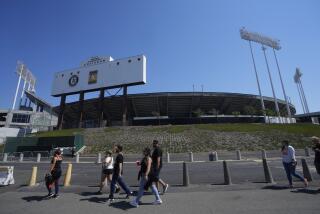A Kings’ Ransom for Sacramento
- Share via
SACRAMENTO — Show me the money!
--Pro football receiver Rod Tidwell in the movie “Jerry Maguire.”
****
Los Angeles developer Jim Thomas, who five years ago bought the Sacramento Kings pro basketball team, is telling local politicians to show him the money or he’s out of here with his millionaire players.
Never mind that the last 475 home games have been sold out. The average ticket price for this subaverage NBA team is $32, plus $6 for parking, and the arena holds 17,317. Thomas has concluded that the local TV market is just too small and there’s a lot more money to be made elsewhere.
“We have a better offer [from an unnamed city] than we’re even asking you for,” Thomas told the Sacramento City Council on Tuesday night. “The hard, cold fact is--the economic reality is--that the Kings cannot stay in Sacramento unless we have the assistance of this community.”
Sound familiar? This is not a story unique to Sacramento. Taxpayers all over the state and nation have been hit up in recent years by pro sports owners. And usually the taxpayers and their elected representatives have been more willing to subsidize athletic entertainment than spend their money on, say, police or schools.
The Raiders’ Al Davis is among the most notorious of these owners. He abandoned Oakland for Los Angeles several years ago, then returned in 1995 when local pols offered him more than $200 million in loans and stadium renovations. Alameda County supervisors were assured by the Oakland Coliseum president that “the risk is minimal; this deal is sound.” But the deal has soured, and taxpayers now stand to lose $60 million.
Also two years ago, Rams owner Georgia Frontiere abandoned Anaheim for subsidies in St. Louis. San Diego now wants to spend $78 million on stadium improvements to induce Chargers’ owner Alex Spanos not to move his team.
Occasionally these things make some sense for downtown redevelopment. The Los Angeles City Council last week voted to contribute $90 million for a new arena at the Convention Center to house the Lakers basketball and Kings hockey teams. L.A. hopes to revive its ailing heart.
But mostly the owners are playing on local pride.
*
This is especially true in smaller communities where a major league sports franchise provides many fans with self-identity, a feeling of importance to salve the insecurities. Take away our team and we’ll be nobody, they fret. We’ll be off the map.
Mitch Richmond, the Sacramento Kings’ popular shooting guard and only all-star, stoked these self-doubts when he addressed a small rally of ardent fans on the City Hall steps.
“Look back at Cleveland, which lost the Cleveland Browns, and that city was devastated,” Richmond said. “If we lose the Kings, this city goes back to what it’s always been--a dead city.”
There are many Sacramentans, of course, who preferred the old “dead” city. Life was easier. In those days, smog, sprawl and traffic congestion only plagued the Bay Area and L.A.
City Councilman Sam Pannell stirred this same pot at the council meeting. “If we want to keep this [a] little city by the river--and now it’s going to flood--that’s fine. But we’ve gone beyond that.”
Thomas, the silver-haired partner of Maguire Thomas commercial developers, was the best pitchman for pride.
“Sacramento is a major league city,” he said. “You can’t go back now. If you try to do that, you’re going to leave a big, big hole in this community. And you may not know it tomorrow, you may not know it next week. But I guarantee you if you try to go back now, it won’t work.”
*
Well, ya got trouble, my friend. Trouble right here in River City. . . . River City’s got to have a Boys Band.
--Prof. Harold Hill in “The Music Man.”
*
Well, not a Boys Band exactly, but an NBA team.
Thomas offered to keep the Kings in Sacramento for at least 20 years if the city would kick in roughly $150 million. He wanted $60 million in earnest money--now--as part of a $90-million package that would allow him to refinance his arena. The other money would be invested with Thomas in a sports entertainment center. The city and Kings would share some revenues. Thomas said the city could net $3 million over 20 years; city staffers said it could lose $52 million.
Extortion. A subsidy for out-of-control player salaries that average $2 million. Misplaced priorities.
The council members had heard all this from their constituents. The city already is facing an $11-million budget shortfall. Thomas’ request was rejected without a vote. The owner blinked and agreed to negotiate.
The council may yet show Thomas the money. Or it reluctantly may show him the door.
More to Read
Go beyond the scoreboard
Get the latest on L.A.'s teams in the daily Sports Report newsletter.
You may occasionally receive promotional content from the Los Angeles Times.











